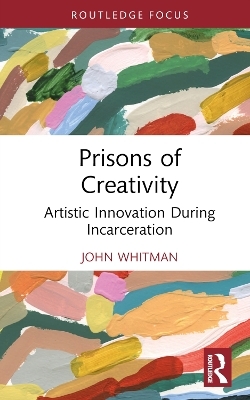
Prisons of Creativity
Artistic Innovation During Incarceration
Seiten
2024
Routledge (Verlag)
978-1-032-90216-6 (ISBN)
Routledge (Verlag)
978-1-032-90216-6 (ISBN)
- Lieferbar (Termin unbekannt)
- Versandkostenfrei innerhalb Deutschlands
- Auch auf Rechnung
- Verfügbarkeit in der Filiale vor Ort prüfen
- Artikel merken
Emphasizing not just the internal, but the external value of creativity in prison, Prisons of Creativity widens and elevates the discourse concerning the institution of prison in society and its social goals.
Sparking a discussion of the importance of creativity for the well-being of society, this book highlights and argues for the potential of those in prison to learn and exercise the skills of writing, visual arts, and music; to protect their intellectual property; and to distribute their works to the public, and the consequent benefits of their creative contribution to wider society.
Focused on the premise that a nation’s well-being and competitive advantage in innovation are advanced by promoting the creative efforts of all its citizens without exclusion, including those residing in prisons, this book uses the United States as a case study to illuminate the potential among any nation’s prison population to contribute to its store of creative works. Arguing that creativity should be encouraged for the benefit of all, it offers a framework for how incarcerated individuals globally could be permitted to engage in learning and undertaking skills in the expressive arts to produce works for public dissemination. Supporting this argument, it explores and analyses the Intellectual Property clause of the Constitution of the United States.
Emphasizing not just the internal but also the external value of creativity in prison, Prisons of Creativity widens and elevates the discourse concerning the institution of prison in society and its social goals. It will be of great value to anyone with an interest in arts in corrections, including educators and practitioners, professionals and policy makers within the criminal justice system, and students and scholars of criminology, criminal justice, and related areas.
Sparking a discussion of the importance of creativity for the well-being of society, this book highlights and argues for the potential of those in prison to learn and exercise the skills of writing, visual arts, and music; to protect their intellectual property; and to distribute their works to the public, and the consequent benefits of their creative contribution to wider society.
Focused on the premise that a nation’s well-being and competitive advantage in innovation are advanced by promoting the creative efforts of all its citizens without exclusion, including those residing in prisons, this book uses the United States as a case study to illuminate the potential among any nation’s prison population to contribute to its store of creative works. Arguing that creativity should be encouraged for the benefit of all, it offers a framework for how incarcerated individuals globally could be permitted to engage in learning and undertaking skills in the expressive arts to produce works for public dissemination. Supporting this argument, it explores and analyses the Intellectual Property clause of the Constitution of the United States.
Emphasizing not just the internal but also the external value of creativity in prison, Prisons of Creativity widens and elevates the discourse concerning the institution of prison in society and its social goals. It will be of great value to anyone with an interest in arts in corrections, including educators and practitioners, professionals and policy makers within the criminal justice system, and students and scholars of criminology, criminal justice, and related areas.
John R. Whitman, Ph.D., is an educator, entrepreneur, and author, writing about innovation, intellectual property protection for underserved populations, and the social economy. He has an A.B. in philosophy from Boston University, an Ed.M. in education from Harvard University, and a doctorate in education from the University of Toronto.
Introduction: The Prospect of Creativity Behind Bars 1. The Creative Impulse at Lincoln’s Cottage 2. The Gift of IP Protection 3. How Prison Unintentionally Stokes Creativity 4. Creators in Print 5. Creators at Work 6. Leading Facilitators 7. A Nationwide Carceral Creativity Framework 8. Superintendents of Creativity
| Erscheinungsdatum | 15.11.2024 |
|---|---|
| Zusatzinfo | 1 Tables, black and white; 18 Halftones, black and white; 18 Illustrations, black and white |
| Verlagsort | London |
| Sprache | englisch |
| Maße | 138 x 216 mm |
| Themenwelt | Kunst / Musik / Theater |
| Recht / Steuern ► EU / Internationales Recht | |
| Recht / Steuern ► Strafrecht ► Kriminologie | |
| Recht / Steuern ► Strafrecht ► Strafverfahrensrecht | |
| ISBN-10 | 1-032-90216-7 / 1032902167 |
| ISBN-13 | 978-1-032-90216-6 / 9781032902166 |
| Zustand | Neuware |
| Haben Sie eine Frage zum Produkt? |
Mehr entdecken
aus dem Bereich
aus dem Bereich
wie wir unsere Mimik und verborgene Körpersignale entschlüsseln
Buch | Hardcover (2022)
Droemer (Verlag)
20,00 €


